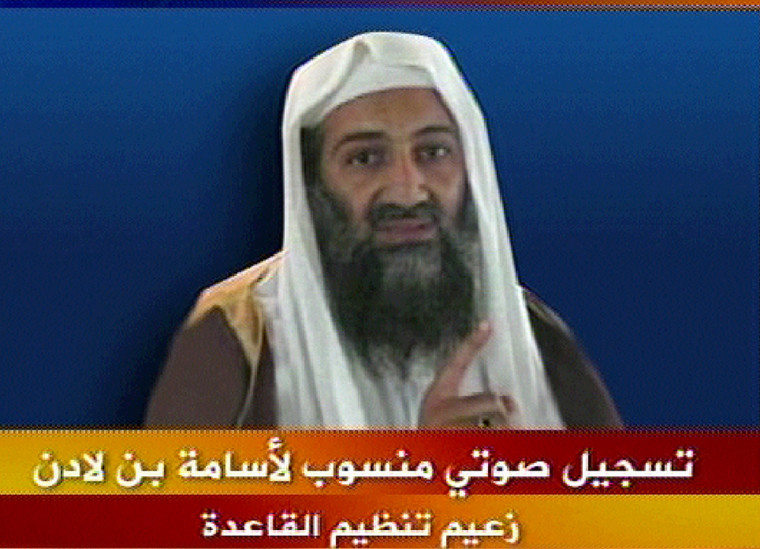When bad news from the Middle East comes to America, one station seems to bring it most often: Al-Jazeera. This week, the satellite network got two exclusives from militants — a video of a kidnapped American and an audiotape from Osama bin Laden.
Does that make Al-Jazeera a mouthpiece for terrorists?
“This is news,” says editor-in-chief Ahmed al-Sheikh. “Any other station would jump at this. Why label us?”
Two weeks ago, the Arab network carried another goading address from bin Laden’s top deputy, Ayman al-Zawahri, who said a limited U.S. troop withdrawal from Iraq represented “the victory of Islam.”
Bringing al-Qaida to the world
Analysts say Al-Jazeera, which is based in and bankrolled by Qatar and has not turned a profit in 10 years on the air, has carved out a niche for itself by channeling al-Qaida to the world.
That makes the network controversial. The statements become huge news events, getting picked up by every major news agency — including The Associated Press — and being vetted for authenticity by the CIA.
“They’re just like any other news organization. Based on their viewership, they make news choices,” said Ben Venzke, a Washington-based U.S. government contractor who analyzes al-Qaida tapes. “The thing that makes them stand apart is that they’re the first recipient of the overwhelming majority of releases from bin Laden and al-Zawahri.”
That fact hasn’t escaped notice in Washington, where President Bush and Defense Secretary Donald Rumsfeld have taken turns criticizing the station, accusing it of fueling anti-American sentiment and giving terrorists a podium.
News value
Al-Jazeera says it deals with tapes purely on the basis of news value.
When tapes come in — the network rarely says how it gets them — Al-Jazeera’s editors wrangle over what portions, if any, they can air, al-Sheikh said.
In the case of the bin Laden message broadcast Thursday, the station played only a few minutes of the 10-minute tape, based on what it considered important, he said. The entire tape was transcribed and posted on Al-Jazeera’s Web site.
Tapes of kidnap victims are the most problematic. When they arrive, the station gets in touch with the hostage’s embassy and asks a representative to view the tape and contact the family. Only when the family is notified does Al-Jazeera air any footage, al-Sheikh said.
Even then, it only airs parts that show the victim in “the most humane light possible,” he said. Al-Jazeera’s editorial policies now prohibit it from carrying the voices of kidnappers or their victims.
No beheadings aired
Rumsfeld and other U.S. officials have accused Al-Jazeera of airing videos of hostages being beheaded. But in fact the station has never done so. The gory videos have appeared on Web forums used by Islamic militants.
On Tuesday, Al-Jazeera showed images of Jill Carroll, 28, an American freelance reporter for The Christian Science Monitor being held by militants in Iraq. Carroll was seen speaking, but Al-Jazeera did not broadcast the audio.
Al-Sheikh said the network edited out Carroll’s statements condemning U.S. military actions. It also cut footage of the reporter being held at gunpoint.
“They were pointing the guns at her head, and these things I cannot put on air,” al-Sheikh said. “She was talking about how they got her, the mujahedeen she called them. She said they were treating her well. She said U.S. forces in Iraq destroy houses and kill innocent people. And then she appealed to the U.S. and the U.S. president to help her and save her life.”
The choice of militants
Militant groups choose to send messages to Al-Jazeera for a variety of reasons, analysts say.
First, bin Laden and al-Zawahri are thought to be most interested in influencing Arab public opinion, and Al-Jazeera may be the best way to reach that audience.
“Al-Qaida’s real target isn’t the United States or the West, it’s Arab public opinion,” said Jon Alterman, who heads the Middle East program at the Center for Strategic and International Studies in Washington. “In terms of getting the most attention from the audience they care about most, Al-Jazeera is the best.”
But the station can’t seem to deflect U.S. critics.
“They got condemned when they aired large portions of those videos. Then they started showing smaller clips and they got criticized for hiding the message,” Venzke said. “They’re damned if they do and damned if they don’t.”
Kathleen Hall Jamieson, director of the University of Pennsylvania’s Annenberg Public Policy Center, said Al-Jazeera has a valuable role.
“Many people say they’re uncomfortable with a partisan journalism source. But we have plenty of them in the United States. ...What’s exciting about the current news environment is that there’s a lot of supplementary information available. In a case like this, Al-Jazeera should be a source. But it shouldn’t be THE source.”
Unpopular with other governments
Allegations have arisen that Bush even suggested to British Prime Minister Tony Blair in 2004 that the station’s headquarters be bombed. White House officials have denied the allegation, which was reported in a British government memo leaked to the press.
The station has had three bureaus destroyed by bombings, two by the U.S. military.
Al-Jazeera is also unpopular with governments in Saudi Arabia, Iraq, Iran and Tunisia, which now ban its reporters. Those countries’ rulers suggest the network incites violence by giving voice to opposition politicians and radical clerics.
At one time or another, Al-Jazeera has had bureaus closed in 18 countries and its signal blocked in 30. It loses money due to an advertising boycott, believed to originate from Saudi government pressure.
But its relentlessly pro-Arab tone has built Al-Jazeera’s credibility among Arab viewers.
“If you promote American policy in the region, you will completely lose your audience,” said Mustafa Alani of the Dubai-based Gulf Research Center. “Their credibility isn’t with an American audience, it’s in the Arab world.”
